
Hong Kong budget ‘to offer incentives to turn city into green maritime hub’
- With fourth deficit in five years being estimated to be over HK$100 billion, Chan expected to deliver measures to boost income, cut expenditures and develop new industries
- Government also plans to hold fireworks and drone shows at Victoria Harbour every month, with different theme each time, according to source
Hong Kong’s finance chief will tap into the US trillion-dollar clean energy market in Wednesday’s budget by setting up a regional green fuel bunkering centre, with financial incentives and infrastructure being offered to vessel owners and the maritime industry to make them more environmentally friendly, the Post has learned.
A source familiar with the policies on Monday said the plan was designed to boost the city’s status as an international logistics hub and that Financial Secretary Paul Chan Mo-po would unveil other proposals to accelerate green finance developments in his budget speech, including the hosting of an international climate financing summit with Dubai’s monetary authority in the autumn.
“Hong Kong has a lot of potential to maximise its economic opportunities by transforming itself into an even greener economy, while the measures can also enhance its status as an international logistics hub to offer more alternatives to vessels and planes,” the source said.

With the fourth deficit in five years being estimated to be more than HK$100 billion (US$12.8 billion), Chan is expected to deliver measures to boost government incomes, cut expenditures and develop new industries, exercising one of his most difficult balancing acts so far.
To encourage vessels registered in Hong Kong to reduce carbon emissions, the city’s authorities will subsidise shipowners who hope to attain a higher carbon reduction rating from the International Maritime Organisation (IMO) through retrofitting their ships to become more energy efficient.
Ships are at present given a rating from A to E, recorded in the vessel’s ship energy efficiency management plan. Ships rated D or E for three years in a row would be required to submit an action plan for improvements to achieve a C or higher.
The IMO has said shipping is responsible for carrying 90 per cent of the world’s trade and accounts for 3 per cent of man-made carbon dioxide emissions.
The industry burns 5 million barrels of fossil fuel a day and the IMO wants to reach net-zero greenhouse gas emissions by 2050.
The source said the ability to supply ocean-going vessels with greener fuel such as methanol would be considered in a study commissioned by the government on green bunkering facilities.
Shipping analysts have already estimated global demand for methanol will double by 2050 because of tighter regulations from the IMO and European countries on fuel emission standards.
Ships with a gross tonnage of 5,000 or more must report their energy efficiency statistics every year under IMO rules that came into force at the start of 2024, and rating thresholds are expected to become increasingly stringent over the next few years.
‘Hong Kong should cut property cooling measures gradually, not all at once’
Studies have shown the use of methanol as fuel can reduce emissions of carbon dioxide by 7 per cent, sulphur oxides by 99 per cent and nitrogen oxides by 60 per cent.
But methanol is also toxic with a low flashpoint for flammability which needs storage facilities with a high level of safety precautions. There are at present more than 120 ports around the world that can store and supply methanol.
“Hong Kong doesn’t need to produce methanol, but we can work on the infrastructure and become a bunkering centre,” the source said.
Similar measures will also be announced to encourage aircraft laying over in the city to use greener fuel, including new policies to create suitable infrastructure and streamlined delivery procedures.
Chan said as he helped launch Hong Kong Green Week on Monday that the amount of global investment in clean energy had mounted to US$1.7 trillion – higher than the upstream sector of the oil industry.
“To put it simply, the vision to [transform the city into a low-carbon economy] will involve three critical factors – technology, finance and internationalisation,” Chan added. “Hong Kong has all the advantages in this regard.”
The source said the Monetary Authority climate financing summit with Dubai later this year would involve an exchange of information on talent and investment from the Middle East and other developed countries to support and finance businesses in the green technology field.
Hong Kong would also act as a middleman to speed up changes in the sector, the source added.
The authority said it was estimated that the Asian region would require US$66 trillion of climate investment over the next three decades.
Hong Kong’s Paul Chan aims for ‘balanced’ budget measures to boost public confidence
The government also plans to hold fireworks and drone shows at Victoria Harbour every month, with a different theme each time, at a cost of hundreds of millions of dollars, according to the source.
The daily multimedia light show at the harbour, “A Symphony of Light”, will also be revamped to attract tourists, the source said. The 10-minute light show, which has been running for 20 years, was last overhauled in 2017 and has often been criticised for a lack of novelty.
Culture authorities said in 2023 that the show was under review and a concrete plan was expected to be unveiled this year.
But the source said the revamp would take time because the government would have to negotiate with owners of buildings involved in the event.
The source added authorities would promote “in-depth tourism” with thematic activities, including biking tours, nighttime running and walking tours introduced to showcase different aspects of the city and enhance the tourist experience.
Yip Tsz-leung, the director of the CY Tung International Centre for Maritime Studies at Polytechnic University, said financial incentives would encourage more shipowners to refuel their vessels in the city and added that the government could also take opportunity to develop related business.
“Apart from bunkering, the vessels also need emergency repair,” Yip said. “They can also conduct other commercial activities in the city, such as registration and seeking financing options.”

He highlighted that the city had an edge over other places in the development of maritime services because it was protected by islands and had relatively calm seas.
Billy Mak Sui-choi, an associate professor in the accountancy, economics and finance department at Baptist University, said the city could boost its international image if more ships turned to green fuels and improved air quality.
Simon Lee Siu-po, an honorary fellow at the Asia-Pacific Institute of Business at the Chinese University of Hong Kong, said the city had the potential to develop green bunkering, but that it should beware of competition from neighbouring jurisdictions, such as Singapore.
Lee said the city would need support from the central government and could explore the market in countries involved in the Belt and Road Initiative, China’s plan to grow global trade.
Additional reporting by Edith Lin and Emily Hung

